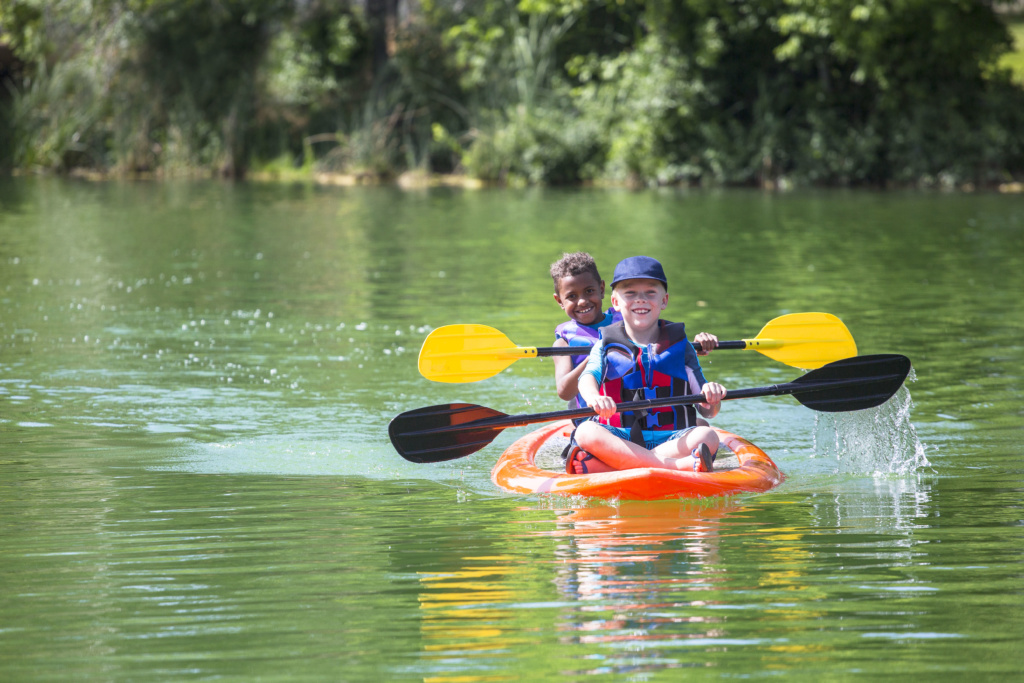Happy Campers
How to keep your child safe and smiling at day camp
By Caroline Fossi, CTW Features
As the school year winds down, it’s time to start making summer plans. For many families, that means scouting out day camp options for the kids.
Besides keeping little ones occupied during the long summer stretch, day camps offer young people the chance to learn new skills, sharpen talents, make friends, practice problem solving and gain independence.
“Camp is really part of lifelong learning,” said Tom Rosenberg, president and CEO of the American Camp Association (ACA), a national nonprofit that works to preserve and improve the camp experience.
But with so many choices available, how can you pick the right one for your child? Here are some tips from camp experts for planning a successful day camp experience:
Explore your options. If you’re new to the day camp world, investigate what’s available in your area. In most communities, you’ll find summer offerings from a wide range of sources, including local recreation departments, schools, churches, museums, and businesses such as dance, theater or karate studios. Talk to friends, co-workers and other trusted sources to find out their favorites.
“Even though (camp) is an old tradition, there’s always something new that’s happening,” said John Duntley, senior camping specialist with the YMCA of the USA, one of the nation’s largest camp providers.
These days, he said, there are day camps available for every interest under the sun, from traditional outdoor sessions with games and nature exploration, to camps catering to sports enthusiasts, science fans or budding artists.
Older kids might consider attending camps focused on real-world skills, college prep or career exploration. Take, for example, Trident Technical College in Charleston, S.C., where campers ages 12-17 can learn everything from culinary techniques, to the art of filmmaking, to how to manage a budget. The public community college also offers camps for younger kids.
Trident Tech plans its summer courses based on input from local families and business professionals, with the goal of “engaging kids’ minds,” said Katherine Jackson, the school’s youth program manager.
Do your research. Once you’ve got a general idea of your community’s camp landscape, it’s time to narrow your choices. Peruse local camp websites and catalogs with your child to see which ones fit his or her interests and age range, and your family’s schedule and budget.
“Parents need to decide what will be in the best interest of their child,” said Duntley of the YMCA. Will your kid thrive at a camp with a singular focus, such as a tennis or robotics camp, or would she be happier sampling many different activities throughout the day?
If your children will be attending multiple weeks of day camp, you’ll want to decide whether to stick with one camp provider throughout the summer, or to try out different camps around town. If you’re sticking with one location, make sure the itinerary varies from week to week so the kids don’t get bored. Even specialty camps should have some variety built into the day, experts say.
**A Savvy Parent’s Checklist: What to Bring to Day Camp**
Most camps will provide families with a packing checklist, but here are some general guidelines on what to stash in your kiddo’s camp bag.
*Remember to label all items with your child’s name*
Sunscreen and sun-protective clothing (hat, long-sleeved shirt, etc.)
A jacket, sweatshirt or raincoat, depending on the weather
A water bottle
Bug spray
Snacks and a lunch, if needed
A towel, swimsuit and extra bag for wet gear (if water activities are planned)
Medication, if needed
Campers should wear sneakers or other sturdy shoes. They can bring flip-flops or water shoes if needed for swim or water play time.
Review the camp’s policy on cell phones or other personal electronics. Some ban such devices, while others have rules on when they can be used during the camp day.
Many camps offer half- or full-day options, and some have extended morning or evening hours to meet the needs of working parents.
Once you’ve got your top camp picks, find out sign-up dates and mark your calendar for the day registration opens. Many camps start enrollment in late winter or early spring, and popular spots fill up fast.
If you’re worried about camp costs, ask about financial aid. Many camps offer need-based scholarships, a sliding scale or a payment plan, Rosenberg said.
Play it safe. Whatever camp you choose, kids’ safety should be a top priority.
Oversight and regulation of camp operations vary significantly from state to state, according to the ACA. In some places, the state health department oversees camps, while in others, counties or cities manage licensing and permitting.
The American Camp Association vets camps through a voluntary accreditation process. Parents can check the organization’s website for a list of ACA-accredited camps that have met a strict set of standards for safety and quality.
To learn more about a particular camp’s safety practices and philosophy, check its website or make an appointment with the director before summer sessions start. Ask about hiring and training practices and the camper to counselor ratio. If campers will be swimming, research the camp’s water safety procedures. If field trips are on the agenda, find out how many adults will be on the bus, in addition to the driver.
Plan ahead and partner up. Kids who are naturally anxious or new to day camp can ease jitters by visiting the campsite and meeting staff in advance. Many camps hold open houses or orientations where caregivers and campers can ask questions and check out the location.
To further soothe fears, enlist a friend to enroll in camp with your child. Most camp organizers will try to accommodate “buddy requests” and place pals in the same group.
Once camp starts, be sure to talk to your child about his experiences. Scan the camp itinerary for conversation starters, like: “What did you make during craft time today?”
Communication with camp personnel is also key to a positive camp experience. Alert the director if your child has dietary restrictions, allergies or a medical condition. If your little one is anxious or simply had a rough morning, let counselors know she might need some extra attention.
Don’t hesitate to give feedback to staff, whether it’s a concern or a compliment, Rosenberg said. “They want to be your partner.”
© CTW Features




